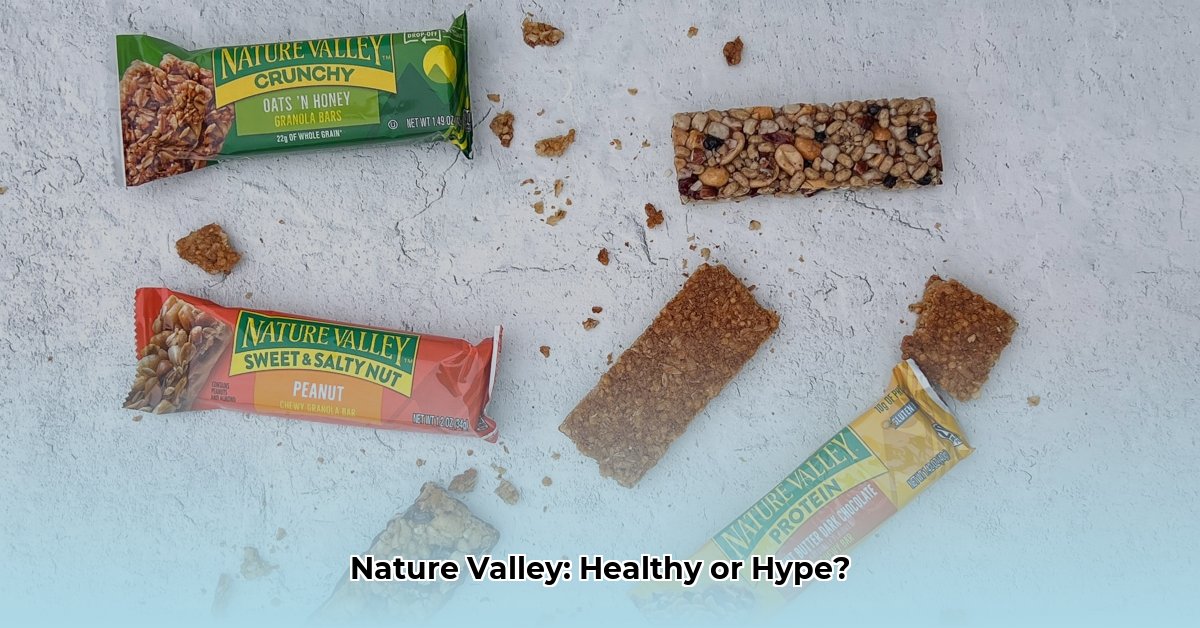Nature Valley bars: the ubiquitous grab-and-go snack found in gym bags, lunchboxes, and desk drawers everywhere. But beneath the wholesome branding and images of nature, a crucial question remains: are they truly a healthy choice? This article provides a detailed, comparative analysis to help you navigate the Nature Valley aisle and make informed snack decisions.
Decoding the Nutrition Label
Understanding nutrition labels is key to assessing any food’s healthfulness. Let’s decipher the key components: serving size, calories, fat, carbohydrates (including sugars and fiber), and protein. Fiber, a friend to your digestive system, promotes regularity and can contribute to feelings of fullness. Added sugars, however, offer minimal nutritional value and may contribute to health issues if consumed in excess.
The Sugar Conundrum: Natural vs. Added
Sugar isn’t inherently “bad.” Naturally occurring sugars in fruits and honey come bundled with other nutrients. Added sugars, like high fructose corn syrup, often found in processed foods, are a different story. While some Nature Valley bars utilize honey, many also contain added sugars. It’s essential to distinguish between these types and be mindful of the total amount.
Ingredient Spotlight: Beyond the Oats
Whole grain oats frequently take center stage in Nature Valley bars, providing a good source of fiber. However, a closer look at the ingredient list often reveals added sugars, processed oils (like canola and sunflower oil), and sometimes, artificial flavors. While not inherently harmful, these components offer less nutritional value than whole, unprocessed alternatives.
Comparing Nature Valley Bars: A Nutritional Overview
A side-by-side comparison helps illustrate the nutritional variations between different Nature Valley bar types. Remember, product formulations can change, so checking the label on your specific bar is crucial.
| Bar Type | Calories | Fat (g) | Sugar (g) | Fiber (g) | Protein (g) |
|---|---|---|---|---|---|
| Crunchy Oats ‘n Honey | ~110 | ~4.5 | ~8 | ~1 | ~2 |
| Sweet & Salty Nut Peanut | ~180 | ~11 | ~9 | ~2 | ~6 |
| Fruit & Nut Chewy Trail Mix | ~170 | ~9 | ~11 | ~3 | ~4 |
| Protein Peanut Butter Dark Chocolate | ~190 | ~10 | ~10 | ~4 | ~10 |
These values are approximate and may vary. Always refer to the product packaging for the most up-to-date nutritional information.
As illustrated, even within the same brand, nutritional content can differ significantly. The Fruit & Nut bar, for example, offers more fiber but also more sugar. The Protein bar, as expected, boasts higher protein but also higher fat content.
Nature Valley Bars vs. Other Snacks: A Reality Check
How do Nature Valley bars stack up against other snacks like fruits, nuts, or yogurt? Whole, unprocessed foods generally offer a more nutrient-dense profile with less added sugar and a richer array of vitamins, minerals, and antioxidants. Compared to other processed snacks, Nature Valley bars might offer some advantages, such as added fiber and protein, but it depends on the specific bar and the alternative you’re considering.
The Verdict: Are Nature Valley Bars a Healthy Choice?
There’s no simple “yes” or “no” answer. Nature Valley bars can be part of a balanced diet, but moderation and careful selection are key. They provide convenience and can be a source of whole grains and fiber, but some varieties contain high levels of added sugar and processed ingredients.
Pros:
- Convenience and portability
- Source of whole grains and fiber (in many varieties)
- Available in a wide range of flavors
Cons:
- Can be high in added sugars
- Some varieties contain processed oils and artificial flavors
- Not as nutrient-dense as whole, unprocessed snacks
For a healthier choice, opt for Nature Valley bars lower in added sugar and higher in fiber and protein. Consider pairing them with whole foods like fruit or nuts for a more balanced snack. Ultimately, the “healthiness” of a Nature Valley bar depends on your individual dietary needs and overall eating habits. Remember, current nutritional research continues to evolve, and it’s always wise to stay informed and make choices that align with your health goals. If you have specific dietary concerns, consulting a registered dietitian or healthcare professional is recommended. This information is current as of October 26, 2023, and will be updated periodically to reflect the latest nutritional data and research.
- Rectangular Glass Food Storage Containers For Meal Prep - January 27, 2026
- Borosilicate Glass Food Containers Keep Meals Fresh and Organized - January 26, 2026
- Choosing Glass Containers With Snap Lids for Fresh Food Storage - January 25, 2026










